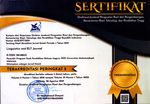Students’ Perception on AI Technology : Gemini as a Writing Assistant Tool
Abstract
Keywords
Full Text:
PDFReferences
C. M. Fernández-García, R. Maulana, M. Inda-Caro, M. Helms-Lorenz, and O. García-Pérez, “Student perceptions of secondary education teaching effectiveness: General profile, the role of personal factors, and educational level,” Front. Psychol., vol. 10, no. MAR, 2019, doi: 10.3389/fpsyg.2019.00533.
A. Alam and A. Mohanty, “Cultural beliefs and equity in educational institutions: exploring the social and philosophical notions of ability groupings in teaching and learning of mathematics,” International Journal of Adolescence and Youth, vol. 28, no. 1. Routledge, 2023. doi: 10.1080/02673843.2023.2270662.
N. Tebbett, H. Jöns, and M. Hoyler, “Openness towards diversity? Cultural homophily in student perceptions of teaching and learning provided by international and home academics,” Glob. Soc. Educ., vol. 19, no. 5, pp. 522–544, 2021, doi: 10.1080/14767724.2020.1835464.
A. Shoufan, “Exploring Students’ Perceptions of ChatGPT: Thematic Analysis and Follow-Up Survey,” IEEE Access, vol. 11, pp. 38805–38818, 2023, doi: 10.1109/ACCESS.2023.3268224.
D. Raufelder, L. Nitsche, S. Breitmeyer, S. Keßler, E. Herrmann, and N. Regner, “Students’ perception of ‘good’ and ‘bad’ teachers-Results of a qualitative thematic analysis with German adolescents,” Int. J. Educ. Res., vol. 75, pp. 31–44, 2016, doi: 10.1016/j.ijer.2015.11.004.
M. Prorok, “Applications of artificial intelligence systems,” Deliberationes, vol. 15, no. Különszám, pp. 76–88, 2022, doi: 10.54230/delib.2022.k.sz.76.
L. Chen, P. Chen, and Z. Lin, “Artificial Intelligence in Education: A Review,” IEEE Access, vol. 8, pp. 75264–75278, 2020, doi: 10.1109/ACCESS.2020.2988510.
M. Usman Hadi et al., “Large Language Models: A Comprehensive Survey of its Applications, Challenges, Limitations, and Future Prospects Large Language Models: A Comprehensive Survey of Applications, Challenges, Limitations, and Future Prospects”, doi: 10.36227/techrxiv.23589741.v4.
V. Plevris, G. Papazafeiropoulos, and A. Jiménez Rios, “Chatbots Put to the Test in Math and Logic Problems: A Comparison and Assessment of ChatGPT-3.5, ChatGPT-4, and Google Bard,” AI, vol. 4, no. 4, pp. 949–969, Dec. 2023, doi: 10.3390/ai4040048.
E. Supriyadi, P. Studi, T. Industri, S. Tinggi, and T. Bandung, “EXPLORING GOOGLE BARD’S (GEMINI) ROLE IN ENHANCING RESEARCH ARTICLES IN COMPUTATIONAL THINKING AND MATHEMATICS EDUCATION Corresponding Author,” Papanda J. Math. Sci. Res., vol. 3, no. 1, pp. 28–37, 2024.
I. Ahmed and R. Islam, “Gemini-the most powerful LLM: Myth or Truth,” 2024, doi: 10.36227/techrxiv.171177477.70151414/v1.
J. Shopovski, “Generative Artificial Intelligence, AI for Scientific Writing: A Literature Review,” 2024, doi: 10.20944/preprints202406.0011.v1.
J. Rudolph, S. Tan, and S. Tan, “War of the chatbots: Bard, Bing Chat, ChatGPT, Ernie and beyond. The new AI gold rush and its impact on higher education,” J. Appl. Learn. Teach., vol. 6, no. 1, pp. 364–389, Jan. 2023, doi: 10.37074/jalt.2023.6.1.23.
B. D. Wale and Y. F. Kassahun, “The Transformative Power of AI Writing Technologies: Enhancing EFL Writing Instruction through the Integrative Use of Writerly and Google Docs,” Hum. Behav. Emerg. Technol., vol. 2024, 2024, doi: 10.1155/2024/9221377.
M. S. Ramírez-Montoya, M. I. Loaiza-Aguirre, A. Zúñiga-Ojeda, and M. Portuguez-Castro, “Characterization of the teaching profile within the framework of education 4.0,” Futur. Internet, vol. 13, no. 4, pp. 1–17, 2021, doi: 10.3390/fi13040091.
S. TÜMEN AKYILDIZ and K. H. AHMED, “An Overview of Qualitative Research and Focus Group Discussion,” Int. J. Acad. Res. Educ., vol. 7, no. 1, pp. 1–15, Dec. 2021, doi: 10.17985/ijare.866762.
S. Mashuri, M. Sarib, A. Rasak, and F. Alhabsyi, “Semi-structured Interview: A Methodological Reflection on the Development of a Qualitative Research Instrument in Educational Studies Ruslin,” vol. 12, no. 1, pp. 22–29, doi: 10.9790/7388-1201052229.
D. I. Prastiawan, S. Aisjah, and R. Rofiaty, “The Effect of Perceived Usefulness, Perceived Ease of Use, and Social Influence on the Use of Mobile Banking through the Mediation of Attitude Toward Use,” Asia Pacific Manag. Bus. Appl., vol. 009, no. 03, pp. 243–260, Apr. 2021, doi: 10.21776/ub.apmba.2021.009.03.4.
A. A. Rahsepar, N. Tavakoli, G. H. J. Kim, C. Hassani, F. Abtin, and A. Bedayat, “How AI Responds to Common Lung Cancer Questions: ChatGPT versus Google Bard,” Radiology, vol. 307, no. 5, 2023, doi: 10.1148/radiol.230922.
Bal Ram and Pratima Verma, “Artificial intelligence AI-based Chatbot study of ChatGPT, Google AI Bard and Baidu AI,” World J. Adv. Eng. Technol. Sci., vol. 8, no. 1, pp. 258–261, Feb. 2023, doi: 10.30574/wjaets.2023.8.1.0045.
Gemma Team et al., “Gemma: Open Models Based on Gemini Research and Technology,” 2024, [Online]. Available: http://arxiv.org/abs/2403.08295
M. Waqqor Bukhori, M. Giyaatsusshidqi, N. Agustina, and Y. Sabilal Huda, “Implementasi Penggunaan AI Dalam Proses Pembelajaran Mahasiswa Teknologi Pendidikan Angkatan 2023”.
DOI: https://doi.org/10.31764/leltj.v12i1.24393
Refbacks
- There are currently no refbacks.
Copyright (c) 2024 dhio rizky ananda

This work is licensed under a Creative Commons Attribution-ShareAlike 4.0 International License.
_____________________________________________________
Linguistics and ELT Journal
p-ISSN 2339-2940 | e-ISSN 2614-8633

LELTJ is licensed under a Creative Commons Attribution-ShareAlike 4.0 International License.
_____________________________________________________
LELTJ is abstracting & indexing in the following databases:
_____________________________________________________
LELTJ Editorial Office:













